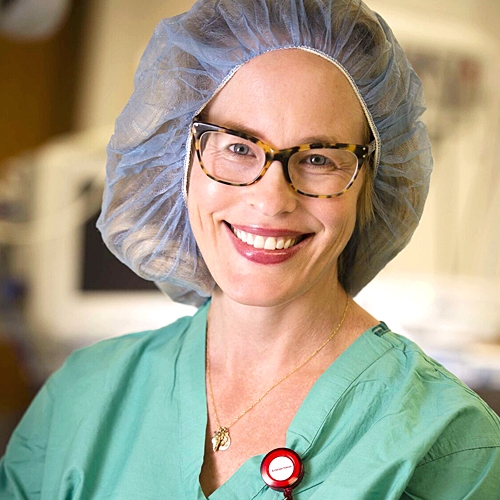 IBCLC Detailed Content Outline: Pathology Focused CERPs - Section III
IBCLC Detailed Content Outline: Pathology Focused CERPs - Section III
Access CERPs on Pathology for the IBCLC Detailed Content Outline recertification requirements. Enjoy convenient on-demand viewing of the latest Pathology focused IBCLC CERPs at your own pace.

Newborn Screening for Critical Congenital Heart Defects (CCHD) Using Pulse Oximetry

Regina Grazel is a certified perinatal advanced practice nurse with more than 30 years of neonatal nursing experience. She holds several clinical designations, including ANCC board-certified high-risk perinatal nurse, neonatal resuscitation program regional trainer, NANN neonatal developmental care specialist, and certified breastfeeding counselor. Jean is currently serving on the National Association of Neonatal Nurses (NANN) Board of Directors as the Immediate Past President having completed her term as President in October 2016. Jean is also a former president of the Delaware Valley chapter of NANN. After many years as a Perinatal Clinical Nurse Specialist in the acute care setting, she has moved into the public health arena. Jean is employed by the New Jersey Chapter of the American Academy of Pediatrics as the Program Director for the New Jersey Department of Health Critical Congenital Heart Defects Screening Program and Zika Infant Surveillance.
This presentation will review the background and importance of newborn screening with pulse oximetry to aid in the early detection of critical congenital heart defects and other serious conditions. Factors influencing implementation of the screening including legislation, advocacy efforts and recommendations by professional medical associations will be covered. Best practices for performing the screening will be reviewed as well as implications for screening in the NICU and other special populations. The results of the first statewide screening program implemented in the US will be shared to demonstrate the unique contribution of pulse oximetry in the detection of previously unrecognized CCHD.

View Details / Enroll

Newborns are Children too! Ethical Challenges in Neonatology
 Franco Carnevale,
RN, PhD (Psych), PhD (Phil); Nurse, Psychologist, Clinical Ethicist(Children & Youth)
Franco Carnevale,
RN, PhD (Psych), PhD (Phil); Nurse, Psychologist, Clinical Ethicist(Children & Youth)

Franco A. Carnevale is a nurse, psychologist and clinical ethicist. He completed: an undergraduate nursing degree, three master's degrees (nursing, education, bioethics), and doctorate in counseling psychology at McGill University; a master’s degree in philosophy at Université de Sherbrooke and a second doctorate in moral philosophy at Université Laval. Dr. Carnevale is the founder and principal investigator for VOICE (Views On Interdisciplinary Childhood Ethics); a McGill University-based international initiative to advance knowledge and practices relating to ethical concerns in childhood. Current academic appointments include (McGill University): Full Professor, Ingram School of Nursing; Associate Member, Faculty of Medicine (Pediatrics); Adjunct Professor, Counselling Psychology; Affiliate Member, Biomedical Ethics Unit. Clinical appointments include: Associate Member, Pediatric Critical Care, Montreal Children's Hospital; Clinical Ethics Consultant, The Lighthouse, Children and Families (pediatric hospice and respite care); Clinical Ethicist, Child, Adolescent, and Family Services, Douglas Mental Health University Institute; Chair, Clinical Ethics Committee, Shriner's Hospitals for Children (Canada). Dr. Carnevale is a founding member of the Board of Directors of the World Federation of Pediatric Intensive and Critical Care Societies (WFPICCS) and founding member of the Editorial Board of Pediatric Critical Care Medicine.
 Franco Carnevale,
RN, PhD (Psych), PhD (Phil); Nurse, Psychologist, Clinical Ethicist(Children & Youth)
Franco Carnevale,
RN, PhD (Psych), PhD (Phil); Nurse, Psychologist, Clinical Ethicist(Children & Youth)
Advances in pediatric ethics have helped identify ethical concerns that arise in the care of children as well as strategies for addressing these concerns. Despite these important innovations, some significant ethical problems persist in neonatology, which seem rooted in particular challenges involved in the care of newborns and their families. These include concerns regarding: excessive care for infants with limited prognoses; dismissive care toward projected disability; providing palliative care; parental roles and responsibilities; inadequate pain management; cross-cultural disagreements; and moral distress among staff and parents. These tensions commonly relate to: (a) difficulties in defining infants’ best interests; (b) tensions regarding the respective decisional authority of parents and health professionals; and (c) tragic situations where all treatment options seem wrong. Strategies for analyzing and reconciling these ethical concerns will be discussed.

View Details / Enroll

Nitty Gritty Anatomy: The Cranium, Supporting Structure and the Muscle Layer

Dr. Gerner has been a Maternity and Pediatric Specialist in private practice for over 17 years with an additional focus on functional infant cranial work. She teaches other professionals to support breastfeeding across the USA and internationally. She is a wife, mother of 3 grown children, and lives in Northern CA with her husband and their 2 rescued dogs.
Topic: Introductions and Establishing the Value of Integration - [View Abstract]
Topic: Nitty Gritty Anatomy: The Cranium, Supporting Structure and the Muscle Layer - [View Abstract]
Topic: Tying It All Together- Consequences of Pathology and Ideal Collaboration - [View Abstract]
Understanding the specific infant anatomy related to feeding function can unlock the mystery of why the baby is struggling and how to correct the problem. You will see very comprehensive video demonstration of normal function and easy to understand diagrams of common subluxation patterns. This presentation focuses on: (1) The infant cranial and spinal anatomy piece by piece and how it all interacts together; (2) The main muscles of breastfeeding function; (3) clinical presentations of common feeding challenges explained through the anatomy; and (4) correlations into other common infant pathologies of torticollis and Otitis Media.

Optimizing Growth and Body Composition in Preterm Infants: Approaches to Neonatal Nutritional Care in Clinical Practice

Dr Mark Johnson is a consultant neonatologist at University Hospital Southampton NHS Foundation Trust and an honorary senior clinical lecturer in neonatal medicine at the University of Southampton. He is also currently the clinical director for neonatal medicine in Southampton. Dr Johnson graduated in medicine (BM) from the University of Southampton in 2004, and undertook an intercalated degree in biomedical science during his medical training. Dr Johnson was awarded a prestigious NIHR doctoral research fellowship to fund his PhD, which he was awarded by the University of Southampton in 2015. Dr Johnson’s PhD focused on change management in neonatal care in the context of nutrition, successfully implementing improved nutritional practices in order to improve the growth of preterm infants. Dr Johnson's research centres around the nutritional care and growth of premature babies, and the implementation of practice change in order to improve care, and has published on these topics widely, including systematic reviews looking at the use of early parenteral nutrition in preterm infants, the impact of enhanced nutrition on the neurodevelopmental outcomes of preterm infants and the effect of preterm birth on body composition and growth. He has also contributed to national and international guidance on nutritional care.
Current recommendations for the growth of preterm infants are that they should try and achieve the same pattern of growth they would they were still in-utero. This growth should be both the right quantity, but also the right quality in terms of body composition and the relative proportions of fat and lean tissue. This requires higher amounts of nutrition that can be difficult to deliver, meaning that preterm infants are at risk of poor growth and body composition that favours fat accretion over lean mass. This is important, as nutrition, growth and body composition in early life are associated with neurodevelopmental outcomes and longer-term cardiovascular risk. However, the exact pattern of growth that results in optimal short- and long-term outcomes in these infants is not well defined. This talk will explore current patterns of growth, the evidence for the pattern of growth for optimal clinical outcomes, and what can be achieved in clinical practice. It will then go on to consider different strategies for nutritional care and how these can be implemented in clinical practice for preterm infants in the neonatal unit to achieve optimal growth.

View Details / Enroll

Our Hands as Tools to Resolve Acute Breast Pain in the Early Postpartum Period

Maya Bolman was born and raised in Minsk, Belarus. She was certified as IBCLC in 2001 and currently works as a lactation consultant at Senders Pediatrics and Breastfeeding Medicine of Northeast Ohio.
Maya is well known internationally for her work promoting hand expression and breast massage to health professionals and parents. She recognizes that teaching these basic tools helps empower them to work through breastfeeding challenges including engorgement, plugged ducts, separation from the infant, and milk supply concerns.
She has worked with Dr. Ann Witt to create an instructional video “The Basics of Breast Massage and Hand Expression” and conducts research on the effectiveness of Therapeutic Breast Massage in Lactation (TBML) both in the office and as a treatment at home for mothers.
Topic: Our Hands as Tools to Resolve Acute Breast Pain in the Early Postpartum Period - [View Abstract]
Breast pain is a major cause of weaning. Milk stasis, which occurs in engorgement, mastitis and plugged ducts, is a common cause of pain that may lead to the temporary or permanent cessation of breastfeeding. Therapeutic Breast Massage in Lactation (TBML) is one clinical tool to help resolve breast pain quickly. Therapeutic Breast Massage in Lactation (TBML) provides a simple, readily accessible method that can be easily taught to parents and health professionals. Empowering parents to resolve complications at home may be a critical skill for extending breastfeeding duration.

View Details / Enroll

Overcoming Challenges to Feeding: Supporting Parents with Physical, Mental or Socioemotional Differences - Part 1

Julie Matheney knew when she was ten years old that she wanted to feed babies for a living. She earned her Masters in speech-language pathology and has worked with feeding and swallowing disorders for over a decade. While most people assume speech therapists teach children who stutter or work on ""r's and s's"", the bulk of her job is feeding and swallowing as part of a hospital based, rehabilitation team. The same things you speak with, you eat with! Over the past decade working in the NICU, she discovered her passion for working with breastfeeding families and became an IBCLC in 2018.
She transitioned out of the hospital in July 2021 and currently works full time in private practice as a lactation consultant in Los Angeles. She enjoys helping the whole family in the feeding process to meet their goals.
Her loving husband is always supportive of her in her vocational passions and was instrumental in launching her private practice. She has two young daughters, both of whom were exclusively breastfed until two years old.
Topic: Overcoming Challenges to Feeding: Supporting Parents with Physical, Mental or Socioemotional Differences - Part 1 - [View Abstract]
Topic: Overcoming Challenges to Feeding: Supporting Parents with Physical, Mental or Socioemotional Differences - Part 2 - [View Abstract]
For years we have learned how to support breastfeeding for the infant with differences and disabilities. There is a lack of education and support however for mothers/lactating parents who face these same challenges. Studies show parents with differences and disabilities are less likely to receive adequate prenatal care and breastfeeding assistance compared to those without disabilities. How do we support lactation for parents who have physical, mental, and emotional/social differences? Each type of difference or disability also has specific needs for adaptations, to the environment and to the tools we would use to facilitate position, latch, and lactation success. This session helps participants use critical thinking to ask the right questions, make adjustments to the environment, and create functional plans specific to the individual needs of the parent. The three domains we will be discussing are physical challenges, social/emotional challenges, and the neurodiverse.

View Details / Enroll


Katrina B. Mitchell, MD, IBCLC, PMH-C is a breast surgeon, lactation consultant, and perinatal mental health provider. Her surgical practice includes the care of women with breast cancer and benign breast disease. She sees runs a daily breastfeeding medicine practice, treating patients for a wide variety of lactation concerns ranging from hypolactation to nipple trauma. Additionally, she provides medication management and support for women impacted by perinatal mood and anxiety conditions.
Dr. Mitchell lectures locally, nationally, and internationally on the intersection of lactation and surgery, and has authored book chapters, clinical care protocols, and journal articles on the topic. She is the creator of the physicianguidetobreastfeeding.org, an evidence-based resource for breastfeeding families and the communities that support them. Dr. Mitchell resides in Santa Barbara, California and practices at the Ridley Tree Cancer Center at Sansum Clinic. She enjoys reading, traveling, and spending time with her son camping at the beach. She can be reached at physicianguidetobreastfeeding.org.
Topic: Performing Physical Breast Assessment - [View Abstract]
The purpose of this presentation is to first review basic components of the breast physical exam, including assessment of the breast, nipple areolar complex (NAC) and regional nodal basins. We also briefly will review breast imaging that may be required for diagnostic purposes in the setting of lactation.

Persistent Pain During Breastfeeding - A Challenge in Lactation Counseling

Alexandra Glass is a gynecologist/ obstetrician and an International Board Certified Lactation Consultant working in Hanover, Germany, where she lives with her family. Alexandra is the Vice President of BDL Lactation Consultant Association. She speaks at Local, National and International conferences and she teaches preparatory courses for the IBCLC exam. She is the mother of two daughters, who were both breastfed.
This presentation will give an overview of the reasons that can cause painful breastfeeding and how we can intervene either via breastfeeding management or medically.
The reasons might be
- poor latch
- problems with sucking, like tongue tie or other anatomical issues, also nipple confusion
- vasospasms
- infections, mastitis
- Mammary Constriction Syndrome
- injuries or medical conditions of the skin, such as psoriasis, dermatoses, eczema
- oversupply
- plugged ducts
- incorrect pumping or hand expression
- allodynia/functional pain
- psychological and emotional aspects
Important aspects concerning breastfeeding management and counselling and possible therapeutic interventions will be discussed as well as the impact of painful breastfeeding on the breastfeeding dyad and the whole family.

View Details / Enroll

Physiologic Biomarkers to Detect Subclinical Acute Kidney Injury in Premature Infants

Dr. Marin is currently an Assistant Professor at Augusta University, and is an active researcher in the Level IV NICU at Children’s Hospital of Georgia. She received her BSN from the University of Tennessee, her MSN from Stony Brook and her PhD from Emory University. Dr. Marin’s program of research is focused on defining non-invasive methods to predict early-onset acute kidney injury in preterm infants, including analysis of metabolomics, proteomics, the gut-kidney microbiome axis, and renal hypoxia measured by near-infrared spectroscopy as they relate to subclinical and actual acute kidney disease.
Acute kidney Injury (AKI) prior to the completion of nephrogenesis at 34 weeks’ gestation has significant life-long effects. The immature kidney only receives 3-4% of total cardiac output, compared to 20% in term infants, children and adults. Therefore, minimal decreases in oxygen delivery may substantially compromise proper oxygen utilization increasing the risk for morphologic changes and reduced nephron endowment. Current diagnostic criteria (serum creatinine (sCr) elevations with oliguria) cannot detect early-onset AKI, as up to 50% of nephron damage has already occurred by the time these abnormalities become apparent. This presentation will look at new research related to the current diagnostic criteria for AKI in the preterm infant, the physiologic mechanisms involved in AKI and short and long-term implications.

View Details / Enroll

Popular Diet Trends: Impact and Safety During Lactation

Meghan McMillin holds a Master’s Degree in Human Nutrition from the University of Illinois at Chicago. She has been a Registered Dietitian Nutritionist (RDN) since 2013 and became an International Board Certified Lactation Consultant (IBCLC) in 2019.
Meghan spent 5 years working clinically in the NICU, pediatric floor and women’s units of a local hospital. In 2019, Meghan started her own private practice and consulting company, Mama & Sweet Pea Nutrition, with a focus on postpartum and infant care. The mama to two young kids with food allergies, helping other families manage food allergies, whether it’s while breastfeeding, during the introduction of solids, or later in childhood, is her passion.
Meghan is a member of the International Lactation Consultant Association and the United States Lactation Consultant Association. She enjoys sharing her knowledge through social media and public speaking. Meghan is the coauthor of the eBook What To Eat When Your Baby Can’t Tolerate Milk, Soy, or Egg Protein; Nutrition guidance for avoiding milk, soy, and/or eggs while lactating.
Meghan has presented both nationally and internationally including for GOLD learning, the National WIC Association and the Academy of Nutrition and Dietetics. In 2020, Meghan was awarded the Emerging Professional in Women's Health Award from the Women's Health Dietetic Practice Group of the Academy of Nutrition and Dietetics.
Topic: Popular Diet Trends: Impact and Safety During Lactation - [View Abstract]
Diet culture is pervasive and it seems everyday brings about a new popular trend or style in how, when, or what to eat. The postpartum period often brings about an incredible amount of pressure to lose weight or “bounce back” to pre-pregnancy body shape. It’s no wonder many turn to popular diet trends with the promises of quick weight loss. However, with a lack of research in the lactating population, there remains concern regarding both the effect these diets may have on milk supply and their safety. This presentation will provide lactation professionals with the information they need to have informative discussions with their clients about popular diet trends.

View Details / Enroll













